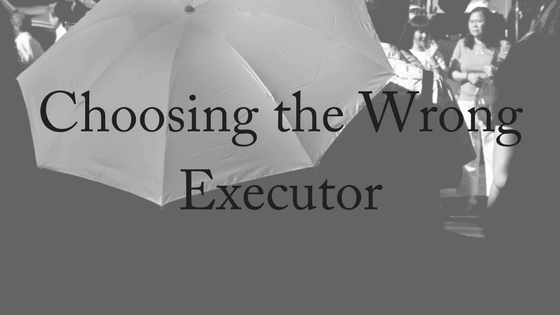Be careful who you choose as the executor of your estate; sometimes the temptation to commit fraud can be too much.
A jealous son who was sick of his brother being the ‘favourite’, was jailed for four years for cheating his brother out of a $1.5 million inheritance. Peter Howes was so resentful of his older brother Jonathan, who lived in Singapore and Hong Kong, leaving him to care for their elderly mother that he began to siphon cash from their parent’s estate. Peter Howes wound up a number of trusts by forging his mother’s and brother’s signatures and cashed in two life insurance policies unbeknownst to his family.
 Following his father’s death in 2004, Howes was given sole responsibility of the administration of the family trusts. The brothers were entitled to half the estate each, but Howes transferred cash from the trusts to a joint account with his mother, and then into his own accounts. He used to money to buy 40% of an online gaming company.
Following his father’s death in 2004, Howes was given sole responsibility of the administration of the family trusts. The brothers were entitled to half the estate each, but Howes transferred cash from the trusts to a joint account with his mother, and then into his own accounts. He used to money to buy 40% of an online gaming company.
When Mrs Howes died in 2010, Howes wound up one of the trusts and gave his brother $109,000, telling him that the remainder of the money was still tied up in the trusts. However solicitors acting for Jonathan discovered the deception and Howes was subsequently charged with five counts of fraud.
The judge described Howes as ruthless, saying: “…in terms of [your mother’s] finances, you failed her dishonestly. You have been convicted of dishonesty and abuse and that word abuse can be used in its full sense of your role.”
The financial abuse of elderly parents is the most common form of elder abuse, says Bryan Mitchell, principal of Mitchells Solicitors. There might be a sense of entitlement, that the money will go to the children anyway. Or there is a real sense, as in this case, that one child is entitled to more than the other. Whatever form it takes, financial exploitation is abuse and should not be tolerated. This is why it is extremely important to choose the right person to be your trustee or executor of the will.
Choosing the Right Trustee/Executor 
It is vitally important to choose the right trustee or executor because it can make the process of administering your estate much easier. You’ll have peace of mind that once you pass away, your estate will be handled according to your wishes. However, in the case of Peter Howes, the trust that was bestowed on him was horridly misused. Fortunately, there are some steps you can follow to help ensure that you’ve chosen the right people to be your trustee or executor.
You should choose your trustee or executor while continuing to consider the future. Think about their future as well as your own: will they still be alive and have the necessary mental capacity when you pass away to do the job? It should also be someone you know to understand your wishes and who can objectively carry out the tasks required. You should let your trustee know what you wish for them to do, as then they will be able to prepare for their role. If they lack the necessary abilities to fulfill their role, then you have time to find another trustee.
The person should also be someone who shows great organisational qualities. Someone who is able to organise documents and ensure everything is done on time is someone you should consider for the job! A trustee or executor is someone who should be able to make time sacrifices for carrying out your wishes. Your partner may be working full time or your sister may have four children, therefore they may not be the best choices.
Sometimes you may wish to consider a family member, but this may not be ideal for your estate. Family members may not have the experience or may not understand the complexity of the role. Also, you may rightly worry that this will put a strain on relationships with other family members. In these cases, it can be best to consider an alternative party to control your trusts or administer your estate. Talk to your lawyer; often a professional is able to administer the estate effectively and efficiently.
Sometimes it can be best to name a team for your trust or will – unless you choose a group of people who are unlikely to agree on anything. If you believe this will lead to arguments, it may not be the best decision. When you go to amend your will every few years, reconsider your trustee and executor. Are they good choices? Are they still able to handle the load? Are they still trustworthy? This decision does not have to be one off, and you can always amend the decision.
Bryan Mitchell has often represented parents and siblings who have been financially abused by a family member and is asked by television programs such as A Current Affair for his opinion each time a case is made public. If you suspect financial abuse is happening in your family, contact Estate Battles immediately. At Estate Battles, we can also help ensure that your will is managed and set out correctly.
We offer a FREE, ten-minute phone consultation. Contact us today!

